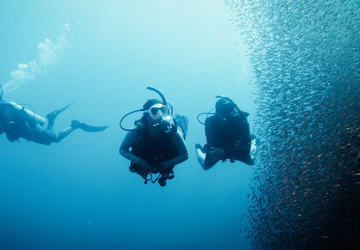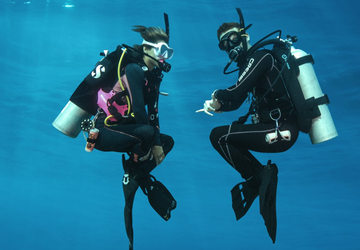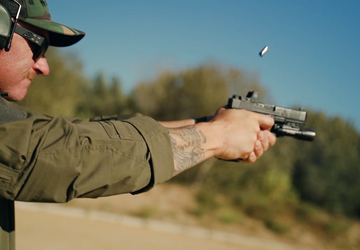Scuba diving is a thrilling adventure that lets you explore the wonders of the underwater world. If you've been diving for a while and are eager to take your skills deeper, you've come to the right place. To dive deeper into scuba diving, you need to build a strong foundation of knowledge and skills.
In this guide, we'll take you through the steps to venture into deeper waters safely and confidently. From mastering the basics to choosing the right dive sites, we'll provide practical advice to enhance your diving experience. So, if you're ready to unlock the mysteries of the deep blue, let's dive right in!
Start with the Basics
Scuba diving is a thrilling adventure that lets you explore the wonders of the underwater world. If you've been diving for a while and are eager to take your skills deeper, you've come to the right place. To dive deeper into scuba diving, you need to build a strong foundation of knowledge and skills.
Begin with the basics. Ensure you have a solid grasp of fundamental scuba diving techniques, equipment, and safety procedures. This includes effectively understanding how to use your mask, fins, regulator, and buoyancy control device (BCD). Regularly practice these skills in shallow waters to build your confidence and muscle memory.
Get Proper Training
Taking your diving to deeper levels requires proper training. Enroll in an advanced scuba diving course, such as the PADI Advanced Open Water Diver or the NAUI Advanced Scuba Diver. These courses teach you essential skills like deep diving, underwater navigation, and night diving.
Deep diving training is crucial as it equips you with the knowledge to safely explore depths beyond 18 meters (60 feet). You'll learn how to manage nitrogen narcosis, a condition affecting divers at greater depths, and how to plan and execute deep dives responsibly.
Choose the Right Dive Site
When you're ready to dive deeper, pick the right dive site. Not all locations are suitable for deep diving. Look for sites that offer a gradual descent and have interesting underwater features to explore, like walls, wrecks, or reefs.
Research the local conditions, including currents and visibility, before heading out. It's also essential to check if the dive site has the necessary facilities and support like air fills and emergency services.
Master Your Buoyancy
Buoyancy control is the key to a successful deep dive. Proper buoyancy allows you to conserve energy, maintain depth, and enjoy a longer dive. Practice your buoyancy control in shallow waters, adjusting your weights and BCD until you achieve neutral buoyancy.
During a deep dive, it's crucial to monitor your buoyancy constantly, especially when ascending or descending. Make small adjustments using your BCD or your breath to stay at the desired depth. Remember, over-inflating your BCD can cause you to ascend too quickly, and under-inflating can make you sink deeper than intended.
Plan Your Dive
Before every dive, create a detailed dive plan. For deep dives, planning is even more critical. Calculate your maximum depth based on your training and experience. Factor in your air consumption rate, and always leave a margin for safety. Plan your ascent and decompression stops if necessary.
Ensure you have a dive computer or depth gauge to monitor your depth continuously. Stick to your plan and communicate it with your dive buddy. A well-thought-out plan reduces the risks associated with deep diving.
Dive with a Buddy
Deep diving is a team effort. Never venture into the depths alone; always dive with a buddy. A companion provides an extra layer of safety, as you can assist each other in emergencies.
Stay close to your buddy throughout the dive and maintain visual contact. Establish hand signals to communicate effectively underwater. Regularly check on each other's air supply, depth, and well-being.
Manage Your Air Supply
As you descend to greater depths, your air supply diminishes more rapidly due to increased pressure. Efficiently managing your air is crucial for a successful deep dive. Begin your dive with a full tank and closely monitor your pressure gauge.
Limit your air consumption by maintaining a slow, relaxed breathing pattern. Avoid unnecessary movements and use your fins efficiently for propulsion. If you notice that your air is depleting faster than anticipated, it's time to signal your buddy and start your ascent.
Equalize Your Ears
As you descend deeper underwater, the pressure increases, which can cause discomfort and potential damage to your ears if not properly equalized. To avoid ear issues, practice equalizing your ears early and often during your descent.
Pinch your nose and gently blow out while swallowing or yawning to equalize the pressure in your middle ear. Avoid descending too quickly, as this can make equalization challenging. If you have difficulty equalizing, signal your buddy and ascend slightly to try again.
Be Mindful of Nitrogen Narcosis
Nitrogen narcosis, often referred to as "rapture of the deep," is a potential hazard when diving beyond 18 meters (60 feet). It can affect your judgment and decision-making. To mitigate this risk, ascend slowly and stay well-hydrated before your dive.
Watch for signs of nitrogen narcosis, such as impaired coordination, confusion, or euphoria. If you experience these symptoms, ascend to a shallower depth where the effects will diminish. It's essential to recognize and respond to these symptoms promptly.
Stay Informed and Keep Learning
Deep diving is an exciting pursuit but comes with increased risks. To dive deeper safely, continue expanding your knowledge and skills. Stay informed about the latest dive technology, safety practices, and underwater environments.
Consider taking specialized courses like wreck diving or technical diving to explore even greater depths. Learning is a lifelong journey in scuba diving, and the more you know, the safer and more enjoyable your deep dives will become.
Conclusion
Diving deeper in scuba diving is an attainable goal for any enthusiastic diver. Start with a strong foundation, get the right training, choose suitable dive sites, and hone your skills. Remember to prioritize safety, dive with a buddy, and always plan your dives meticulously. With dedication and practice, you'll unlock the mysteries of the deep blue and experience the wonders beneath the surface. Happy diving!




